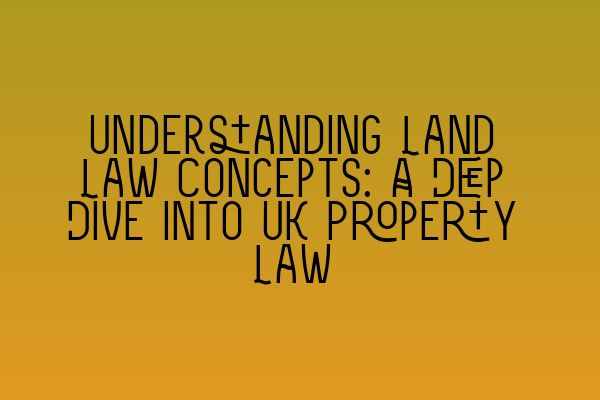Understanding Land Law Concepts: A Deep Dive into UK Property Law
Welcome to the SQE Property Law & Land Law blog! In this article, we will take a comprehensive look at the intricacies of UK property law, exploring key concepts and regulations that govern land ownership and transactions. Whether you are a solicitor, law student, or simply curious about property law, this deep dive will equip you with the knowledge you need to navigate the complex world of land law.
1. Introduction to Land Law
Land law is a vital component of the legal system in the UK, governing the rights and obligations associated with land and property. It establishes the framework for the ownership, use, and transfer of real estate. Understanding the fundamental concepts of land law is crucial for any legal professional practicing in the realm of property law.
2. Freehold and Leasehold
One of the fundamental distinctions in land law is between freehold and leasehold ownership. Freehold ownership grants the holder full ownership of the land, while leasehold ownership involves a lease agreement where the land is rented for a specified period. To gain a deeper understanding of these concepts, check out our related article on Contract Law Reforms: An Analysis of Recent Changes.
3. Registered and Unregistered Land
Land in the UK can be either registered or unregistered. Registered land is recorded in the Land Register, which provides security by establishing a clear and indisputable ownership record. Unregistered land, on the other hand, does not have an entry in the Land Register, making its ownership harder to trace.
4. Property Rights and Interests
Various property rights and interests can exist in land, such as easements and covenants. Easements grant rights to use or access another person’s land, while covenants are legally binding obligations between landowners. It is essential to understand these rights and interests to effectively advise clients in property transactions and disputes.
5. Land Mortgages
In a real estate transaction, mortgages are commonly used to secure loans against properties. Understanding the intricacies of land mortgages is essential for solicitors involved in property finance, as it determines the rights and obligations of borrowers and lenders. For a further understanding of contracts and contractual capacity in property law, refer to our related article on Understanding Contractual Capacity: Rights and Limitations.
6. Land Registration System
The UK has a robust land registration system governed by the Land Registration Act. This system provides clarity and certainty in land transactions by establishing a publicly accessible register of land and property rights. Being familiar with the land registration process is vital for property lawyers to ensure a smooth and secure transfer of ownership.
7. Co-ownership and Trusts
Co-ownership of land occurs when multiple individuals jointly own a property. This often raises complex legal issues, especially in the event of disputes or the death of one of the owners. Understanding the principles of co-ownership and trusts is essential to protect the rights of co-owners and handle such situations effectively.
8. Landlord and Tenant Law
Landlord and tenant law outlines the legal relationship between property owners (landlords) and those renting or leasing the property (tenants). It covers various aspects, including tenancy agreements, rent payments, repairs, and evictions. For an interactive learning experience on contract law and to test your knowledge, check out our related article on Interactive SQE Mock Tests for Contract Law: Test Your Knowledge.
9. Dispute Resolution in Property Law
Property disputes can arise at any stage of ownership, from boundary disputes between neighbors to disagreements over planning permission. Understanding the mechanisms for resolving property disputes, such as mediation, arbitration, and court proceedings, is essential for property lawyers to protect their clients’ interests.
10. Conclusion
We hope this deep dive into UK property law has provided you with valuable insights into the complexities of land law. Acquiring a thorough understanding of the key concepts discussed in this article is essential for solicitors practicing in the field of property law. For more expert insights and guidance, consider joining our SQE Contract Law webinars. If you want to explore other related topics, be sure to check out our article on Parties in a Contract: Rights and Responsibilities.
Remember, property law is a dynamic and evolving field, so staying updated and continuously expanding your knowledge is crucial for success in this domain.
